
Related
Topics
Guests
- Christine Ahnfounder and executive director of Women Cross DMZ, a global movement of women mobilizing to end the Korean War.
North Korea is facing international condemnation after conducting a nuclear test on Wednesday. North Korea claims it successfully tested a hydrogen nuclear device for the first time, but U.S. and international experts have voiced doubts over the claim. North Korean state media described the action as an act of self-defense against aggressors. As the United Nations ponders a new round of sanctions, some peace activists say now is the time to push for a treaty to finally end the Korean War, 63 years later. We speak to Christine Ahn, founder and executive director of Women Cross DMZ, a global movement of women mobilizing to end the Korean War.
Transcript
AMY GOODMAN: North Korea is facing international condemnation after conducting a nuclear test Wednesday. North Korea claims it successfully tested a hydrogen nuclear device for the first time, but U.S. and international experts have voiced doubts over the claim. Seismic data shows Wednesday’s test was likely smaller than North Korea’s last nuclear test in 2013. North Korean state media described the action as an act of self-defense against aggressors. But the international community has widely condemned North Korea. The U.N. Security Council held an emergency two-hour meeting Wednesday. Secretary-General Ban Ki-moon described North Korea’s action as “profoundly destabilizing.”
SECRETARY-GENERAL BAN KI-MOON: This act is profoundly destabilizing for regional security and seriously undermines international nonproliferation efforts. I condemn it unequivocally. I demand the DPRK cease any further nuclear activities and meet its obligations for verifiable denuclearization.
AMY GOODMAN: China condemned North Korea’s nuclear test and called for a resumption of the six-party disarmament talks, which broke down in 2009.
HUA CHUNYING: [translated] China has been making efforts to realize the goal of denuclearization of the Korean Peninsula, whether in the words, policies or actions. Maintaining the peace and stability on the Korean Peninsula and in Northeast Asia meet the common interests of all parties concerned. It also requires joint efforts by all parties. The current situation shows the six-party talks should be relaunched as soon as possible. It’s of great importance, urgency and necessity to settle the nuclear issue through the six-party talks framework.
AMY GOODMAN: For the past seven years, President Obama has practiced a policy known as “strategic [patience]” with North Korea, but its effectiveness has come into question. Three of North Korea’s four nuclear tests have come during his presidency.
To talk more about North Korea, we’re joined by Christine Ahn, the founder and executive director of Women Cross DMZ, a global movement of women mobilizing to end the Korean War. Last year she organized a delegation of women peace activists who crossed the heavily fortified Demilitarized Zone, the DMZ, between North and South Korea. In a moment, we’ll speak to Joe Cirincione, the president of Ploughshares Fund in Washington, but we’re going first to Christine in Hawaii.
Talk about what you think North Korea did this week.
CHRISTINE AHN: Hi, Amy. Thanks for having me.
We don’t know. We will not get independently verified assessments of whether North Korea did succeed in a hydrogen bomb, and, as you noted, there are lots of skepticism about whether they did in fact achieve in building and testing a hydrogen bomb. What I think this signals, more than anything, what we do know for certain, is that this is a complete failure of the Obama administration’s strategic patience, which has really been just about waiting and seeing, and waiting for the North Korean regime to collapse.
And what it’s really important for our listeners and the U.S. audience to understand is that North Korea did this test as a direct message to the United States, that they want to—I mean, it’s a really bizarre way to extend a message, but they are unable to get the U.S.’s attention any other way. And they want to sit down and have talks.
And what’s important to understand is that this is in the context of an unended state of war. You know, the 1950-to-’53 Korean War never ended. It ended with a ceasefire. And the signatories to that armistice agreement, which includes the United States, on behalf of the United Nations Command—that included South Korea—China and North Korea. And they promised, within 90 days, to return to sign a peace deal. And 63 years later, that has never happened. And I think that that is at the root cause of why there is this nuclear crisis, why there is militarization on the Korean Peninsula, why there is repression on both sides of the DMZ. We have to see it through the framework of an unended Korean War.
AMY GOODMAN: What would a peace treaty with North Korea look like, Christine Ahn?
CHRISTINE AHN: I think it would look like what the terms of the armistice agreement outlined, which is, one, no new weapons on the Korean Peninsula; that there is a peace deal that ensures the sovereignty, that guarantees a non-aggression pact; in the case between DPRK and U.S. relations, that the U.S. lifts economic sanctions against that country; that there are normalized relations; that, you know, they discuss the withdrawal of U.S. troops from the Korean Peninsula, which there are currently 28,000 troops still on the Korean Peninsula in South Korea; that there are no more new military games, that are conducted regularly between the U.S. and South Korea. And I think that, you know, to really see a nuclear-free Korean Peninsula, we have to have a Korean Peninsula that is free of war.
And I think it’s really important to note the history of the introduction of nuclear weapons onto the Korean Peninsula. For one, 53 years ago—I’m sorry, 63 years ago, on January 7th, the U.S. announced that they had succeeded in producing a hydrogen bomb. I think that tells us a few things. One, it was conducted and tested during the Korean War. We know that Truman had considered dropping atomic bombs on the Korean Peninsula during the Korean War. And we know that the Korean War was a brutal, brutal war. But the point is that it was the U.S. in 1958 that first introduced nuclear weapons onto the Korean Peninsula. They had it in South Korea until 1991, with the—until the disintegration of the Soviet Union. And North Korea is the one that had appealed to the United States and to the international community—which fell upon deaf ears—that the Korean Peninsula should be free of nuclear weapons. And so, you know, they didn’t really begin to pursue nuclear weapons until the Soviet umbrella, nuclear umbrella, was no longer there.
So then there was, you know, the potential preemptive strike during the Clinton administration, that ultimately, you know, from that crisis led to the agreed framework, where North Korea had agreed to freeze its nuclear program and, in exchange, that the U.S. provide light water reactors and fuel, and that, you know, there was the prospect of—and at the end of the Clinton administration, there was the prospect of finally signing a non-aggression pact. And unfortunately, that was foiled with the Al Gore-George Bush debacle. And then we know the recent history with the Obama administration—I mean, sorry, with the Bush administration, in which North Korea landed on the list of “axis of evil.” And North Korea then watched how the U.S. militarily invaded and occupied Iraq, what it did in Afghanistan and what it did to Libya.
And so, I think that, you know, to say that North Korea is pursuing a nuclear weapons program for self-defense isn’t a far cry. And, you know, there are experts all over Washington, D.C., and also in Seoul, including Seok-hyun Hong, who is the CEO of the JoongAng Ilbo Group, which is the largest media conglomerate in South Korea, that said, “Let’s delink regime change with the nuclear talks.” And I think that we will get a genuine response from North Korea if we could do that.

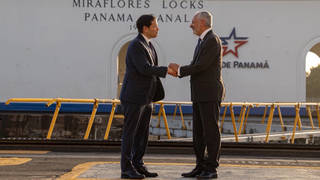
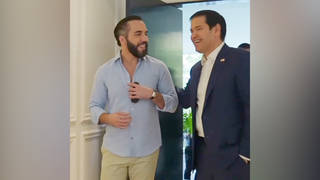
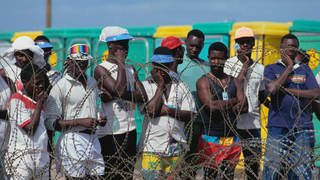
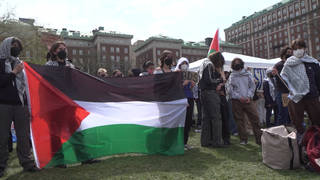






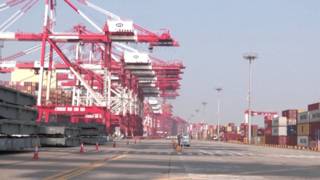
Media Options